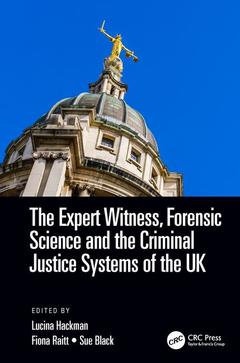The Expert Witness, Forensic Science, and the Criminal Justice Systems of the UK
Coordonnateurs : Hackman S. Lucina, Raitt Fiona, Black Sue

The global nature of crime often requires expert witnesses to work and present their conclusions in courts outside their home jurisdiction with the corresponding need for them to have an understanding of the different structures and systems operating in other jurisdictions. This book will be a resource for UK professionals, as well as those from overseas testifying internationally, as to the workings of all UK jurisdictions. It also will help researchers and students to better understand the UK legal system.
1. Ethics and the Role of the Expert Witness. 2. The Impact of Case Law and Inquiries on the Role of the Expert Witness. 3. Miscarriages of Justice and the Role of the Expert Witness. 4. Expert Evidence in Scotland in Criminal Trials: A Defence Solicitor's Perspective. 5. The Role of the Expert Witness in the Northern Ireland Criminial Justice System. 6. Responsibilities and Obligations of the Expert Witness. 7. Emerging Science in Court. 8. Statistics and the Expert Witness. 9. The Expert Witness in the Inquisitorial Justice System Compared with the Adversarial Systems of the UK. 10. Forensic Science in U.S. Criminal Trials after Melendez-Diaz.
Dr Lucina Hackman
Dr Lucina Hackman is currently a Principal Investigator in Education and Training in Forensic Science at the Leverhulme Research Centre for Forensic Science and the University of Dundee. Prior to this she was a Senior Lecturer at the Centre for Anatomy and Human Identification, where she was responsible for MSc courses. She was the co-editor of 2 books on human identification and has authored book chapters in the same area. She is chair of the Forensic Anthropology Steering Committee at the Royal Anthropological Institute and was lead author in writing the discipline Code of Practice. She is a fellow of the Royal Anthropological Institute and the Royal Society of Biology and a level 1 certified Forensic Anthropologist.
Prof Dame Sue Black
Professor Dame Sue Black is Pro Vice Chancellor at the University of Lancaster. Prior to this appointment she was Director of the Leverhulme Research Centre for Forensic Science and Director of the Centre for Anatomy and Human Identification both at the University of Dundee. She is the President of the Royal Anthropological Institute, Patron of Archaeology in Scotland and the lifetime Professor of Anatomy at the Royal Scottish Academy. She is the author of 15 text books in the fields of human anatomy and forensic anthropology and has given expert evidence in courts throughout the UK and overseas. In 2001 she was awarded an OBE for leading forensic anthropology in the British Forensic Team in Kosovo and in 2016 she was awarded a DBE to recognise her leadership in forensic science. She is a Fellow of the Royal Society of Edinburgh, the Royal Anthropological Institute, the Royal Society of Biology, the Royal College of Physicians of Edinburgh and is a level 1 certified forensic anthropologist.
Prof Fiona Raitt
Fiona Raitt, LLB, PhD, co-founded Wilson & Raitt, a Dundee-based firm of solicitors, where she worked as a solicitor for 13 years, often representing survivors of domestic
Date de parution : 04-2019
15.6x23.4 cm
Thèmes de The Expert Witness, Forensic Science, and the Criminal... :
Mots-clés :
UK Forensic Science; defence witness; Scottish Criminal Case Review Commission; inquisitorial justice systems; DNA Expert; forensic science; Non-accidental Head Injury; criminal trials; DNA Report; UK Government’s Response; DNA Match; Scottish Legal Aid Board; DNA Mixture; UK Jurisdiction; Hm Advocate; DNA Evidence; Forensic DNA; DNA Profile; Law Commission; Professor Sir Roy Meadow; Admissibility Test; Forensic Science Providers; FSR; Cpr; Bayesian Network; Solemn Procedure; Adduce Expert Evidence; Scottish Legal System



